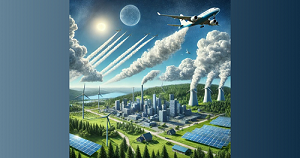Geoinge
Geo-engineering
Geoengineering is a set of techniques aimed at deliberately manipulating the Earth’s environment, generally to mitigate the effects of climate change. These techniques can be grouped into two main categories: carbon capture and storage and the reduction of solar radiation absorbed at the surface.
The first aims to limit the causes of global warming; it is sometimes referred to as negative emissions and is already included in the IPCC scenarios. Few of the associated risks have been identified, although large-scale deployment may require large areas of land and therefore have an impact on biodiversity. However, the technical feasibility of the various methods envisaged remains to be confirmed, the costs need to be assessed more precisely and the environmental impacts analysed.
The second aims to limit solar radiation at the surface, for example by injecting aerosols into the stratosphere, modifying marine clouds by dispersing aerosols, or increasing the albedo of surfaces. In addition to a technological assessment of these methods, the impact on atmospheric circulation, and therefore regional climates, needs to be closely analysed.
Geoengineering is a controversial subject. Some argue that it could offer rapid solutions to climate problems, while others point to potential risks, such as unanticipated side-effects, harmful ecological consequences, and the risk of weakening incentives to reduce greenhouse gas emissions at source.
The IPSL has the skills and tools to carry out an in-depth analysis of the different methods envisaged to reduce the amplitude of global warming. This is why a working group has been proposed and a first meeting was organised in July 2024. A first objective of the working group is to organise regular webinars on these issues. The webinars will provide an opportunity to present and discuss the proposed geoengineering methods: Practical feasibility, potential in the fight against climate change, environmental impacts and associated risks. Ethical issues will not be forgotten.
The working group will also provide an opportunity to pool skills to respond to calls for tenders and requests for expertise that are bound to come in over the next few years.

